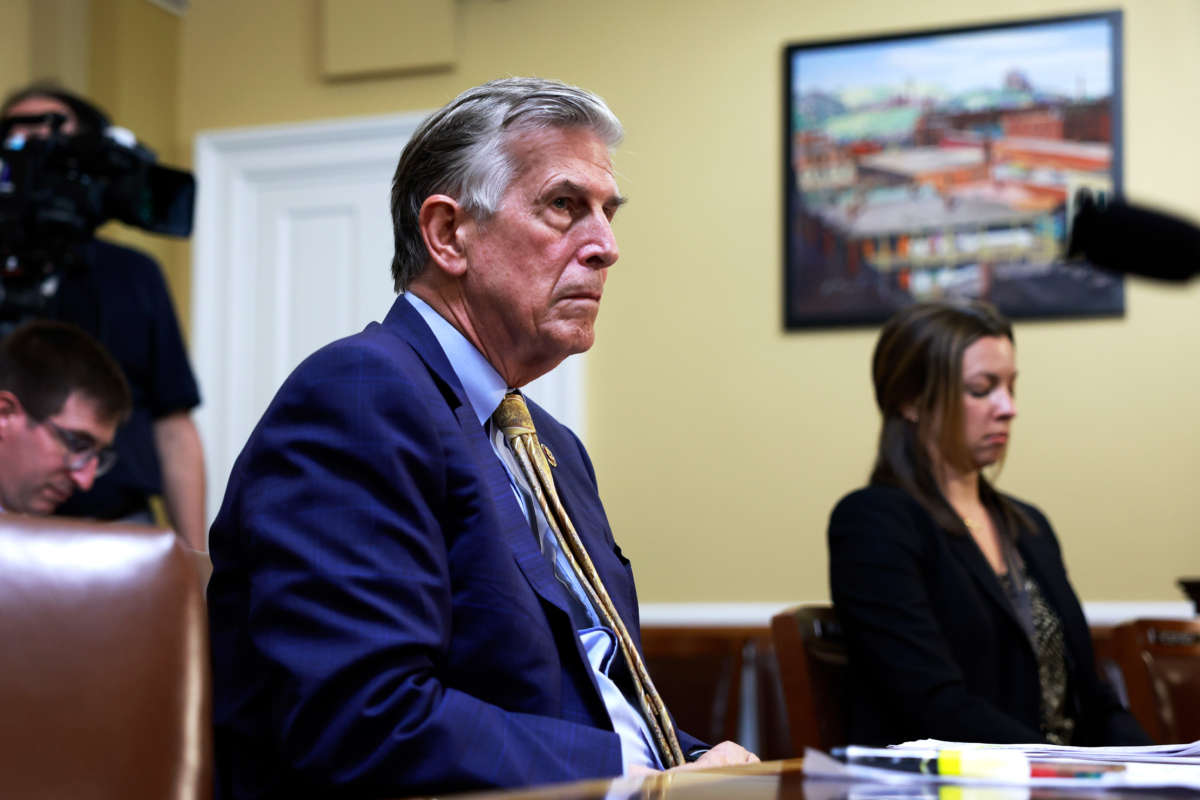Truthout is a vital news source and a living history of political struggle. If you think our work is valuable, support us with a donation of any size.
The Democratic chair of the congressional Joint Economic Committee warned Wednesday that the GOP’s plan to use a looming debt ceiling fight as leverage to secure cuts to Social Security and Medicare would be “economically catastrophic for seniors, families, and our entire economy.”
“Past debt-limit brinksmanship resulted in the first-ever downgrade of the U.S. credit rating and cost the country billions of dollars in lost economic activity, even though a default was ultimately avoided,” Rep. Don Beyer (D-Va.) said in a statement after several House Republicans outlined their intentions in interviews with Bloomberg Government on Tuesday.
“This announcement comes after a previous proposal from the leader of the Senate Republicans’ campaign committee to sunset Social Security, Medicare, and veterans’ benefits in five years,” Beyer continued, referring to Sen. Rick Scott’s (R-Fla.) proposal. “Republicans are once again getting in line to raise costs for low- and middle-income workers and families while offering giveaways to the wealthiest and corporate interests.”
“Not only are these economically disastrous — resulting in fewer jobs, slower economic growth, and higher household costs — they are morally reprehensible,” the Virginia Democrat added.
Several House Republicans vying for the chairmanship of the chamber’s budget committee told Bloomberg that they view a debt ceiling clash — which is expected early next year as the Treasury Department reaches its arbitrary borrowing limit — as an opportunity to pursue long-sought changes to Social Security and Medicare, including benefit cuts and an increase in the retirement age.
“The debt limit is clearly one of those tools that Republicans — that a Republican-controlled Congress — will use,” said Rep. Jason Smith (R-Mo.), who is currently the ranking member of the House Budget Committee.
With the pivotal November midterms less than a month away, House Democrats wasted little time pouncing on the GOP’s latest signal that it plans to pursue cuts to Social Security and Medicare if it retakes control of Congress in the midterm elections, despite the programs’ popularity.
“Republicans have let us in on their plans for Medicare and Social Security — raise the eligibility age and cut benefits. Seniors deserve better,” Rep. John Larson (D-Conn.), chair of the House Ways and Means Social Security Subcommittee, wrote on social media Tuesday. “My plan, Social Security 2100: A Sacred Trust, will protect and expand benefits, not cut them!”
FYI: The reason we keep saying Republicans want to cut Social Security and Medicare is because they keep saying they want to cut Social Security and Medicare.https://t.co/5Wz1Pa4iHt
— House Budget Committee (@HouseBudgetDems) October 11, 2022
Politico reported late last month that a number of Republican congressional candidates — including Arizona U.S. Senate nominee Blake Masters and New Hampshire U.S. Senate hopeful Don Bolduc — have voiced support for cutting or privatizing Social Security and Medicare on the campaign trail in recent weeks.
“The privatization is hugely important,” Bolduc said of Medicare and Medicaid during an August town hall. “Getting government out of it, getting government money with strings attached out of it.”
The official policy agenda of House Republicans also leaves the door open to Medicare and Social Security cuts and privatization, as Common Dreams reported last month.
In key battleground states such as Pennsylvania and Wisconsin, Democratic candidates have seized on their GOP opponents’ attacks on traditional Medicare and Social Security and vowed to defend the programs from right-wing attacks.
After incumbent Sen. Ron Johnson (R-Wis.) said in an August radio interview that Congress “ought to turn everything into discretionary spending” and characterized mandatory Social Security and Medicare outlays as a “debt burden,” Democratic challenger Mandela Barnes warned that the GOP senator “wants to strip working people of the Social Security and Medicare they’ve earned.”
Pennsylvania U.S. Senate candidate John Fetterman has issued similar warnings about his Republican opponent, Dr. Mehmet Oz, who has pledged to further privatize Medicare.
“We can never allow Social Security and Medicare to be weakened by the GOP,” Fetterman wrote in a recent Twitter post. “Dr. Oz would be another vote to take away these critical lifelines for our seniors.”
A terrifying moment. We appeal for your support.
In the last weeks, we have witnessed an authoritarian assault on communities in Minnesota and across the nation.
The need for truthful, grassroots reporting is urgent at this cataclysmic historical moment. Yet, Trump-aligned billionaires and other allies have taken over many legacy media outlets — the culmination of a decades-long campaign to place control of the narrative into the hands of the political right.
We refuse to let Trump’s blatant propaganda machine go unchecked. Untethered to corporate ownership or advertisers, Truthout remains fearless in our reporting and our determination to use journalism as a tool for justice.
But we need your help just to fund our basic expenses. Over 80 percent of Truthout’s funding comes from small individual donations from our community of readers, and over a third of our total budget is supported by recurring monthly donors.
Truthout has launched a fundraiser to add 460 new monthly donors in the next 8 days. Whether you can make a small monthly donation or a larger one-time gift, Truthout only works with your support.
